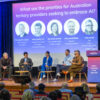Theo Farrell as Vice-Chancellor of La Trobe University, with his VC Fellow Dr Susan Zhang, join as co-hosts and partners with HEDx in opening the latest HEDx conference at the State Library of Victoria. They outline the importance of collaboration and partnerships for conversations and diverse views to forge shared solutions to challenges and opportunities. And they do so on the biggest topic in the sector of how Higher Education will navigate the Age of AI. It forms an opening session at HEDx with Theo and Susan in a fireside chat with Paul LeBlanc who pioneers what AI means to the future of HE in a way that guides La Trobe being AI leaders in an Australian HE landscape.
Changing higher education for good
If you have any questions, suggestions or news please get in touch.





